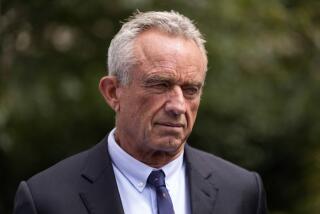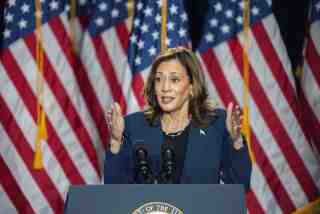Let a thousand scenarios bloom
- Share via
WASHINGTON — No, he is not running for president, Michael R. Bloomberg insisted on Wednesday.
But a day after the billionaire mayor of New York City quit the Republican Party, his clear flirtation with a White House run kept alive a frenzy of speculation on the what-ifs of a prospective third-party bid.
Those who follow presidential politics closely offered a panoply of opinions on how Bloomberg might scramble the calculations of Democrats and Republicans -- even as they expressed doubt that Gotham’s lame-duck mayor could win the White House as an independent.
Some thought a Bloomberg campaign would be a disaster for Democrats, opening the door for a GOP victory despite the dismal poll ratings of the current Republican president.
Others said Republicans would be hurt, especially if they nominate Rudolph W. Giuliani, the man Bloomberg replaced at New York City Hall.
Still others conceded that they had no clue which candidates Bloomberg would help or hurt.
“You need to know who the nominees are” before making any reasonable forecast, said Roy L. Behr, a Democratic strategist who has written a book about third-party candidates.
Nonetheless, the wall-to-wall conjecture underscored the volatility of the rapidly evolving 2008 campaign and a hunger among many Americans for a departure from politics as usually practiced.
“The dynamic of 2008 is a very restive electorate, which has turned on both parties and Washington and is looking for something that’s not traditional,” said GOP strategist Don Sipple.
He added: “They don’t believe the leadership of either party is working for the country, or working in their best interest. That’s the climate that opens things up for a Bloomberg, or any other credible, nonpartisan-type problem-solver.”
Most of the hypothesizing ignored the huge obstacles facing Bloomberg -- or any candidate who tries to win the White House outside the traditional two-party system.
“There will be moments of wild fantasy about him becoming president of the United States, but those moments will tend to overstate the viability of his candidacy,” said Steven J. Rosenstone, a University of Minnesota political scientist and co-author with Behr of “Third Parties in America.”
Rosenstone said the political system was heavily stacked against an independent candidate, in everything from ballot-access laws at the state level to the electoral college, which all but ensures perpetuation of the two-party system.
Bloomberg, an urban-liberal who supports gay rights and gun control, would face a particular set of obstacles beyond the general ones facing any third-party candidate.
“A short, Jewish billionaire from New York?” Bloomberg once asked. “C’mon.”
The mayor sent mixed signals Wednesday at a Manhattan news conference called ostensibly to discuss a municipal matter. Were there any circumstances under which he would consider a presidential run?
“Oh, that’s a hypothetical question,” he said. “If everybody in the world was dead, and I was the only one alive? Sure. I mean c’mon.”
Bound by term limits to step down in 2009, Bloomberg said he intended “to be mayor for the next 925 days and probably about 10 hours -- whatever’s left.”
Yet he offered his views -- in response to questions -- on Iraq, Iran, Social Security and immigration, along with the presidential race itself.
“I do think the more people that run for office, the better,” he said. “And then as we narrow it down, people will, I think, pick and choose, and the choices will look good.”
Bloomberg couched his language in terms familiar to just about any White House hopeful, particularly on “getting guns out of the hands of criminals -- not gun control, not the 2nd Amendment, not your right to hunt.”
With two New Yorkers already leading contenders for president -- Republican Giuliani and Democratic Sen. Hillary Rodham Clinton -- Bloomberg also joked that he was “not sure there’s room for a third.”
Aides acknowledged that rampant talk of a Bloomberg White House campaign helped him maintain clout, especially in Congress and at the New York statehouse. His decision to bolt the GOP dominated Wednesday’s political conversation, with front-page headlines and hours of coverage on radio and television.
“If nothing else, it keeps the pot boiling -- and why not?” said Maurice Carroll, director of the Quinnipiac Polling Institute in Connecticut.
Initial polling suggests that as a presidential candidate, Bloomberg would start as a serious underdog. A recent survey by the Pew Research Center for the People & the Press found that 56% of voters who had heard of the mayor said there was no chance they would cast a ballot for him.
But the fortune he built at the helm of a financial media empire would enable Bloomberg to spend enormous sums on advertising and grass-roots organizing. It also could help him overcome a thicket of obstacles to getting his name on the ballot in many states.
Also potentially helpful: Unity ‘08, a group that plans to spend millions on ballot-access legal efforts to clear the way for an independent or bipartisan ticket for president and vice president.
Unity ’08 co-founder Gerald Rafshoon, a onetime aide to President Carter, said the group would be a logical vehicle for Bloomberg’s candidacy. “I think he’s the perfect independent, and a very competent one,” Rafshoon said.
Still, on election day voters rarely break from the major parties in presidential contests, limiting the potential of third-party contenders, as Ross Perot, Ralph Nader and others can attest. Perot ran stronger than most third-party candidates in 1992, winning about 19% of the popular vote. Still, he did not carry a single state.
Cornell University government professor Theodore J. Lowi, said “two years ago” was already too late for Bloomberg to start gearing up for an ’08 run, “much less now.”
“I know he’s a billionaire and [the millions in legal costs] would just come out of his petty cash,” Lowi said. “But he’d have to spend all his time between now and November 2008, fighting just to get ballot access.”
Lowi, a fierce critic of the two-party system, suggested Bloomberg “hire two or three dozen lawyers” and set his sights on running as an independent in 2012. If he did that, Lowi said, “I’d drop everything and join him.”
--
mark.barabak@latimes.com
Finnegan reported from Washington; Barabak from San Francisco.
More to Read
Sign up for Essential California
The most important California stories and recommendations in your inbox every morning.
You may occasionally receive promotional content from the Los Angeles Times.















